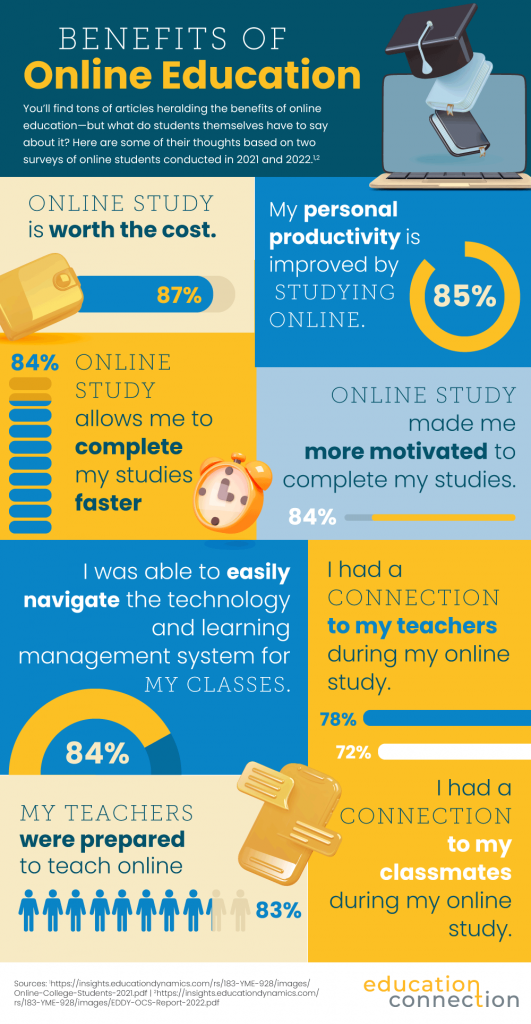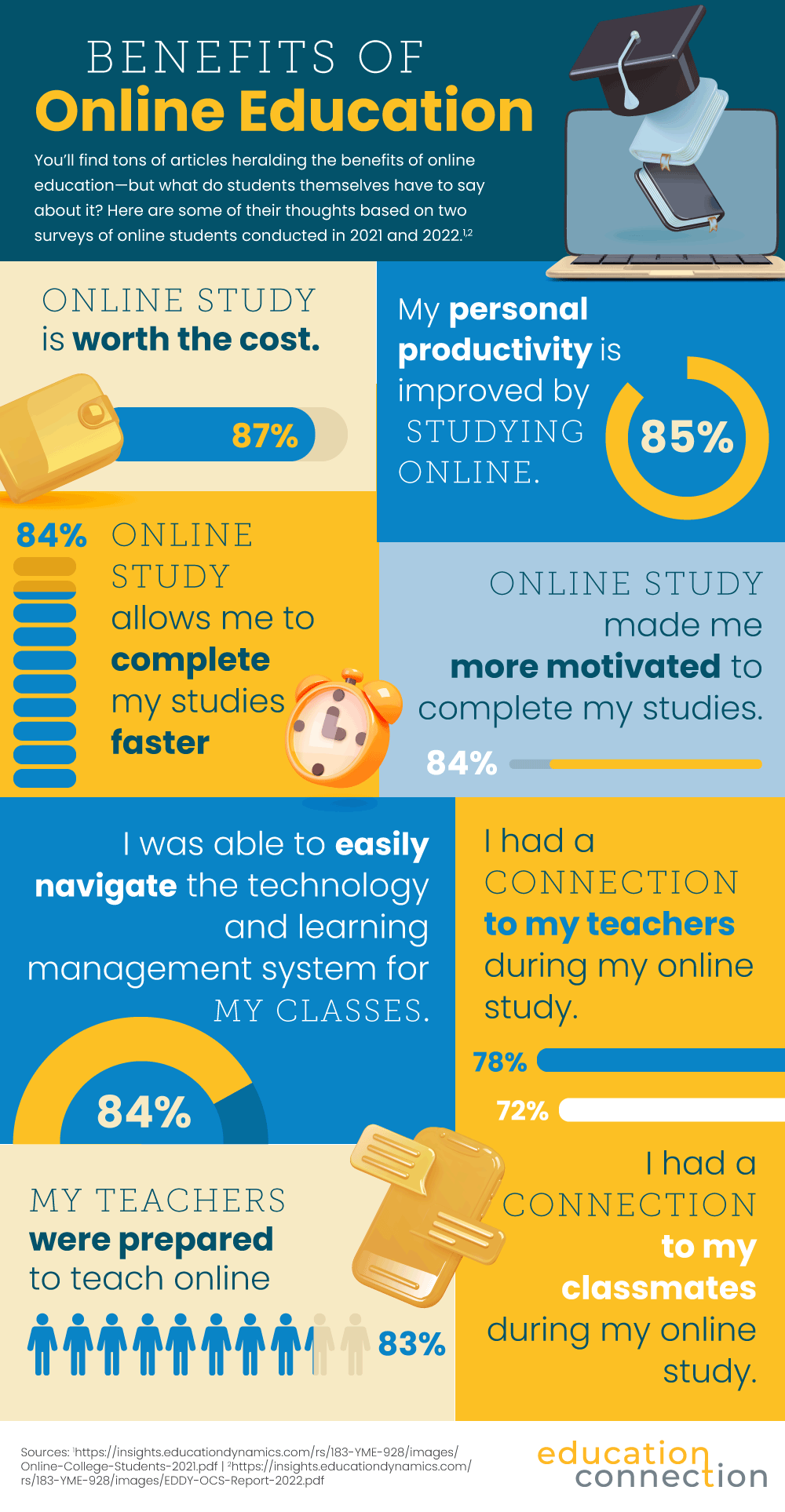Table of Contents
Online education or online learning has gotten its share of bad press, particularly before it became a necessity due to COVID-19. There was skepticism and mistrust about the quality of online courses. People wondered, Are online colleges legit? Is it possible to find a good online school? Online learning was sometimes seen as a less rigorous, less interactive, and less credible alternative to traditional classroom settings.
However, the COVID-19 pandemic forced an unprecedented shift to online learning for many educational institutions, and the numbers of online students increased significantly. Before COVID, in 2019, 37% of undergraduate and graduate students were enrolled in online college courses.1 In 2020, during the peak of COVID, the percentage jumped to 74%.2 Although the percentage decreased to 60% in 2021,2 it is still significant compared to pre-COVID numbers.
Does this increase in online students indicate a change in perception of the quality and desirability of online education? Aslanian Market Research, part of EducationDynamics (EdDY), has been conducting surveys of online students for a number of years in order to examine trends in the scope and perceptions of online education. Their results provide a window into what online college students are saying about this form of study.
Benefits of Online Education
Apparently, students have a lot of good things to say about online education!
Online study is worth the cost
Agree or strongly agree: 87%
Cost is typically a major consideration for students embarking on postsecondary education. They worry not only about the affordability of college, but also whether their expenditure will be worth it in the end.
In 2022, a whopping 87% of online students reported that their online education was worth the cost. This number has grown significantly over the years: In 2017, only 71% of online students agreed or strongly agreed that online education was worth the cost. In 2021, this number jumped to 74%, and in 2022, it reached 87%. This trend could indicate a positive shift in student perceptions of online learning.
Online study allows me to complete my studies faster
Agree: 86%
Online learning offers a unique advantage for students looking to expedite their studies and finish their programs faster. With the flexibility and accessibility that online platforms provide, students could have the freedom to create their own schedules and learn at their own pace, allowing them to optimize their time and focus on their coursework efficiently. Because online college classes can typically be taken at any time, students don’t have to worry about scheduling conflicts and might thus be able to fit in more courses in a shorter timeframe.
Additionally, online learning eliminates the need for commuting to a physical campus, saving time and energy.
My personal productivity is improved by studying online
Agree: 85%
The flexibility of online study gives students the freedom to choose when and where they study, which could allow for better alignment with their peak productivity hours. Moreover, online courses often provide resources such as recorded lectures, notes, and study materials, which could be revisited at any time for review and reinforcement, helping students achieve their educational goals more efficiently.
Online study might also result in fewer distractions—provided students create dedicated study spaces at home that are free from clutter and noise, and away from distractions such as social media or television—which means they could concentrate better and potentially achieve higher levels of productivity. And being able to take breaks as needed rather than at specified times could help reduce burnout and improve focus.
Online study made me more motivated to complete my studies
Agree: 84%
Motivation is an important component of achievement—without the drive to reach a particular goal, it could be very difficult to accomplish it. Online learning requires students to create their own schedule and stay on top of their studies—thus, students take ownership of their learning journey, which could make them more vested in seeing it through.
In addition, the majority of online students cited career-related factors, such as earning more money or getting a promotion, as their primary objective for pursuing an online degree. Students who have a specific objective focused on their career could be more motivated to complete their studies than those who haven’t identified any targeted goals for attending college.
I was able to easily navigate the technology and learning management system for my classes
Agree: 84%
With online education, being able to successfully interact with technology is particularly important, since it is the primary avenue for instruction. Apparently, the majority of online students have been able to rise to the challenge!
My teachers were prepared to teach online
Agree: 83%
The transition to online instruction posed significant challenges for many teachers in various aspects. Firstly, adapting to the technological tools and platforms required a steep learning curve for many educators. They had to quickly familiarize themselves with new software, video conferencing platforms, and online learning management systems, often with limited training and support.
Additionally, the shift from in-person to online instruction changed the dynamics of classroom management and student engagement. Teachers had to find innovative ways to recreate interactive learning experiences, foster meaningful discussions, and maintain student participation remotely.
Despite these difficulties, teachers have demonstrated remarkable resilience and adaptability, utilizing technology and pedagogical strategies to ensure effective online instruction and support their students’ learning journeys. And it seems that online students are happy with the results!
I had a connection to my teachers during my online study
Agree: 78%
I had a connection to my classmates during my online study
Agree: 72%
An early concern about online education was that it would be less interactive than traditional in-class education and make students feel isolated from their teachers and classmates. However, based on the EdDY study, this appears not to be the case for the majority of students.
Online colleges have had to transform the traditional classroom setting in order to provide opportunities for students to connect with their teachers and classmates. By leveraging technology, online programs offer students a range of virtual platforms to engage with instructors and peers, build relationships, and foster a sense of community. Through live virtual lectures or video conferencing, students could interact with their instructors in real time, ask questions, and receive personalized feedback. Additionally, virtual office hours and online chat rooms could allow students to engage more intimately with their instructors, creating a conducive environment for sharing insights, gaining clarification, and receiving academic support.
Students can also check available online graduate programs if looking for an opportunity to pursue graduate school online.
Check out the infographic below to learn more.

Want to use this Benefits of Online Education infographic on your site? Just use the code below!
Suggestions For Improvement
How could online education be improved? Students from the survey had several thoughts about that.
Online programs should include an introductory course about “how to study online” or workshops to prepare students for online study
Agree: 85%
While the majority of students agreed that they were able to easily navigate the technology in their online program, there is more to online education than the technology. Students who have never taken courses online might wonder, What is online college like? How do online colleges work? An orientation course could go a long way in helping students know what to expect and feel more comfortable as they begin their online education journey.
Online programs should include “cohorts” of students who have the same career goals in order to build relationships
Agree: 82%
The EdDY survey reports that the majority of students felt a connection with their peers, but it doesn’t reveal the extent or nature of these connections—in particular, whether students were able to build networking relationships within their field of study. Networking is considered by many to be an important component of finding a job and enhancing one’s career, and thus it should be a priority for online programs to find ways to help students create these types of connections.
Online courses should include virtual field trips and/or simulations
Agree: 76%
Ah, the school field trip! Many of us may have fond memories of the field trips taken throughout our years of primary and secondary education—and apparently online students are looking to recreate those experiences as well.




